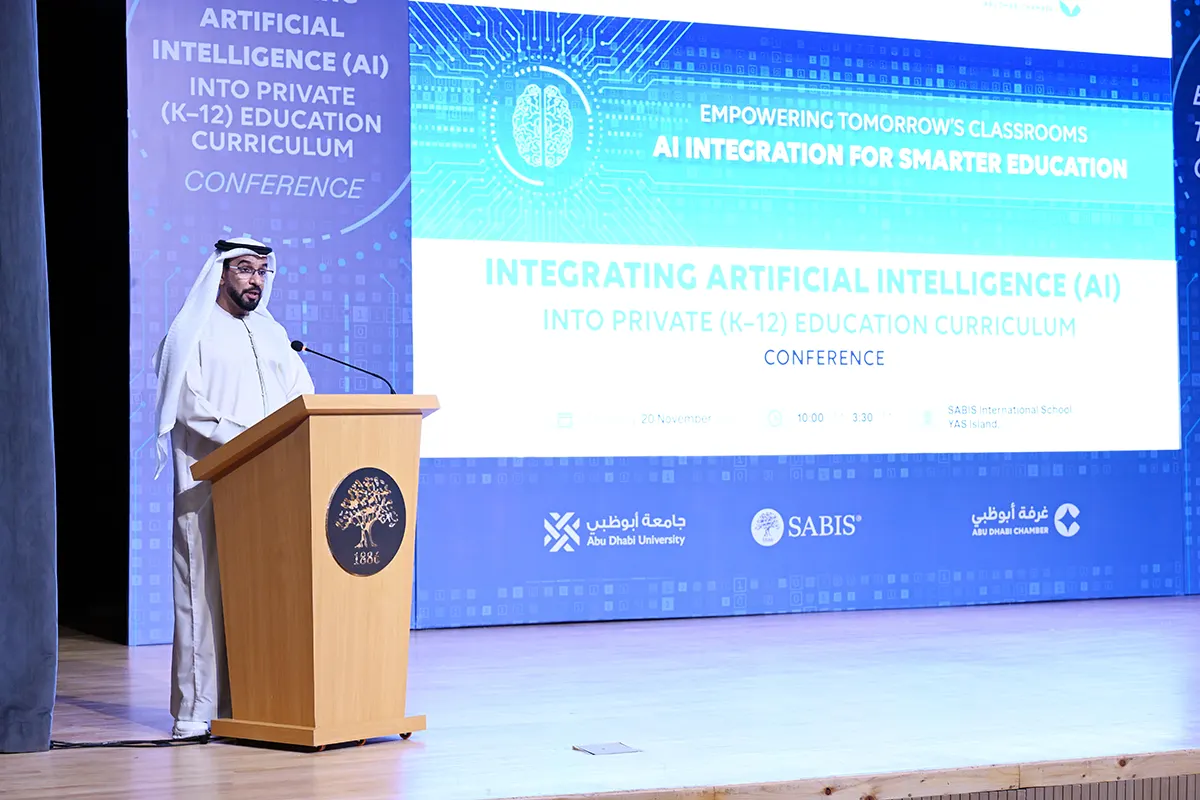The integration of artificial intelligence (AI) into the educational landscape is gaining momentum in the United Arab Emirates (UAE). Central to this shift is the UAE National Strategy for Artificial Intelligence, which emphasizes practical and responsible applications of AI within classroom settings. This was a key focus during a recent conference titled “Integrating Artificial Intelligence (AI) into Private K–12 Education Curriculum – Empowering Tomorrow’s Classrooms,” organized by the Abu Dhabi Chamber of Commerce and Industry (ADCCI) in collaboration with Abu Dhabi University and SABIS International School.
Held at SABIS International School on Yas Island, the event attracted a diverse group of educators, policymakers, and technology leaders. Their collective goal was to explore the future of AI-driven learning across the emirate. H.E. Dr. Ali bin Harmal Aldhaheri, first vice chairman of ADCCI and chairman of the chamber’s Education Working Group, emphasized the need for educational practices to align with the UAE’s broader economic ambitions, encapsulated in what he termed the “Falcon Economy.”
Aligning AI with Educational Objectives
Discussions at the conference centered on how the principles of the UAE National Strategy for Artificial Intelligence can be effectively operationalized in classrooms. Sessions highlighted not only the opportunities presented by AI but also the ethical considerations that accompany its deployment in education. Participants underscored the importance of innovative practices that align with national priorities while prioritizing student wellbeing.
The keynote address from the Ministry of Education focused on AI’s role in designing curricula that enhance learning experiences. Contributions from esteemed institutions such as Abu Dhabi University and SABIS Educational Services enriched the dialogue. Attendees delved into a variety of themes, including the strategic integration of AI from kindergarten through Grade 12, real-world success stories demonstrating the utility of AI tools in education, AI-enhanced school administration systems, and emerging assessment platforms based on machine learning.
Ethics and Governance in AI Education
A major takeaway from the conference was the necessity for robust ethical frameworks and governance structures to guide the implementation of AI tools in educational settings. Speakers highlighted that while AI holds the potential to personalize learning and enhance academic outcomes, it is crucial to ensure that these tools do not compromise student safety or privacy. The event’s panel discussions aimed to align educational priorities with the future direction of AI initiatives, fostering a responsible approach to AI integration.
H.E. Aldhaheri remarked, “Education must move in step with our wider economic ambitions. A strong Falcon Economy depends on strong classrooms. It depends on teachers who are confident using new tools and students who grow up not only using technology but understanding it, questioning it, and improving it.” He emphasized that collaborative dialogues among school leaders, educators, and AI experts are vital for translating broad ambitions into practical applications within classrooms.
Building a Future-Ready Education Ecosystem
The conference represents a significant step towards realizing the UAE’s vision of an innovative, future-ready education ecosystem. By fostering collaboration and capacity building within schools, the initiative aims to equip every student in the UAE to tackle future challenges and contribute to a dynamic, knowledge-driven economy.
With AI’s increasing presence in education, stakeholders must remain vigilant about its ethical implications while harnessing its transformative potential. As discussions continue, the UAE stands at the forefront of an educational revolution, integrating technology in ways that promise to reshape the learning landscape for generations to come.
 AI Revolutionizes Education: Calls for Work-Based Learning to Address Skills Gap
AI Revolutionizes Education: Calls for Work-Based Learning to Address Skills Gap Medical Students at Jinnah College Reveal AI’s Impact on Education in New Study
Medical Students at Jinnah College Reveal AI’s Impact on Education in New Study Kenya Urged to Adopt Global AI Education Charter as 71% Demand Oversight in Schools
Kenya Urged to Adopt Global AI Education Charter as 71% Demand Oversight in Schools Saudi Arabia, Egypt, and Greece Integrate AI to Transform Tourism Education and Hospitality
Saudi Arabia, Egypt, and Greece Integrate AI to Transform Tourism Education and Hospitality Indosat Launches AI Initiative to Address STEM Graduate Shortage in Indonesia
Indosat Launches AI Initiative to Address STEM Graduate Shortage in Indonesia






















































